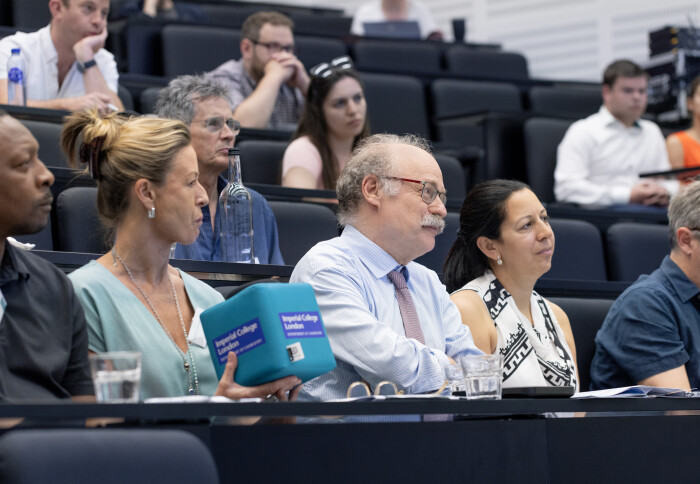Startups tackling plastic waste and ECG monitors win the ICB CDT Dragons' Den
by Jacklin Kwan

Two student startups focusing on cardiac monitoring technology and reducing single-use plastics have won funding to develop their ideas.
Two startups, founded by PhD students from the Institute of Chemical Biology EPSRC Centre for Doctoral Training (ICB CDT), have won funding to push their businesses to the next level.
A Dragons’ Den competition organised by the ICB CDT awarded a first prize of £10k to Wearitech, a startup focusing on wearable ECG monitors, and a runner up prize of £4k to Ocean & Sage, which is developing technologies to reduce plastic waste from personal care products.
The fourth flagship ICB CDT Dragons’ Den final was part of a two-day series of events to commemorate the 20th anniversary of the ICB CDT, which also included, talks, panel discussions, posters and exhibits showcasing technologies developed within the ICB CDT.
In the past, the ICB CDT Dragons’ Den has led to the founding of spinouts, such as FA Bio, a soil health analysis tool startup, and FreshCheck, a startup developing colour-change tools for hygiene verification.
Four teams competed at the final after receiving six months of tailored business coaching, advice about patents and trademarks, as well as pitching training.
The finalist teams were: C-Pro (Zak Elliot & Brian Cunningham), Honest Shot (Jack Dainton & Sofia Philipps), Ocean & Sage (Sachi Sharma, Vanessa Ho & Aileen Cooney) and Wearitech (Owen Griffiths, Shreyas Bhatt & Tom Kitto).
All finalist teams filed patents or trademarks ahead of the final, and will continue to receive further entrepreneurship support and guidance from the ICB CDT as well as Imperial’s Enterprise Lab.
High-accuracy wearable ECG monitors
Wearitech uses portable and comfortable ECG monitoring shirts to provide individuals with data about their cardiac health. Connected with an application that helps consumers predict future cardiac incidents by analysing past data, Wearitech hopes to make personal heart monitoring more accessible to everyday customers.
For a lot of people, heart health is a large source of anxiety. Owen Griffiths Department of Chemistry
“For a lot of people, heart health is a large source of anxiety. We want to empower people to take their heart health into their own hands and not have to go to a hospital all the time,” says Owen Griffiths, a PhD student developing electrochemical biosensors.
The team wants to improve the accuracy of personal health devices. “Products like smart watches claim to monitor your cardiac health but they’re actually really inaccurate, and they don’t continuously monitor your ECG either,” says Shreyas Bhatt, a co-founder of Wearitech who is currently in his third year of his doctoral studies at the ICB CDT.

The team’s ECG monitoring shirt takes more accurate readings with dry electrodes that sit on a person’s chest. They hope that their technology would not only be impactful to those living with pre-existing health conditions, but also groups like athletes.
Griffiths is also a founder of OG Carbon, a startup creating screen-printed carbon electrodes for research. “I actually came to Imperial because it’s got such a great background for entrepreneurialism,” he says.
Wearitech received £10k to develop a minimum viable product from their current working prototype.
Reducing plastic pollution in the personal product packaging
“The fact that 95 per cent of all personal care products is actually just water is crazy. We as consumers have to pay for a product that’s mostly water, and the planet is paying for the pollution associated with packaging and transporting that water,” says Aileen Cooney, an ICB CDT PhD student.

Ocean & Sage seeks to remove water from personal care products in order to drastically reduce the amount of single-use plastics used to package them. Instead, consumers would rehydrate products like shampoo, lotions and more in a reusable bottle by simply adding water.
Their technique would allow different types of personal care products to be effectively dehydrated with the end goal of creating a sustainable and fully customisable system.
The competition gave us the tools to begin thinking with an entrepreneurial mindset. Sachi Sharma Department of Chemistry
“The competition gave us the tools to begin thinking with an entrepreneurial mindset. We’re all scientists, so being trained to know how to start thinking primarily as a business was developed through multiple 1-on-1 sessions we had and multiple pitch sessions,” says Sachi Sharma, a final year PhD student.
The team received £4k to develop a working prototype for their idea. “The training we’ve had, as well as the networks we’ve developed with potential industry partners and investors was invaluable,” says Vanessa Ho, a co-founder also in her final year.
Article text (excluding photos or graphics) © Imperial College London.
Photos and graphics subject to third party copyright used with permission or © Imperial College London.
Reporter
Jacklin Kwan
Faculty of Natural Sciences